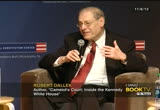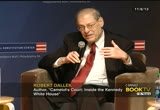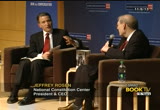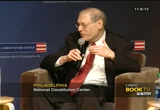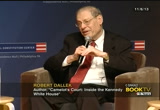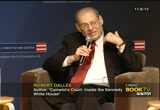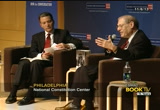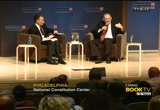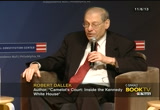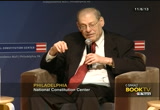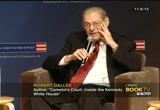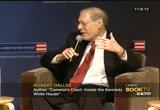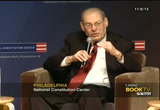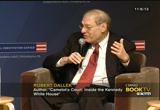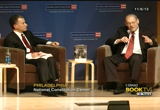tv Book TV CSPAN November 17, 2013 5:45am-6:01am EST
5:45 am
up but he was more self-confident. as he grew he grew in the presence and by the end of 1000 days i think he was much more comfortable in office and very confident that he would win the election. he joked with his aides in the said if we wanted run against barry goldwater we will get to sleep must earlier on election night than we did in 1960 knowing that the race against nixon was so terribly close. so he had a lot of self-confidence at that point and was convinced that -- and of course he did give that great american university speech still worth listening to today and his civil rights speech was very slow to come forward on civil rights but when he finally acted that speech was brilliantly done and from the heart, and was really very impressive.
5:46 am
so you know terribly sad that he they couldn't have had that second term to see what else might have happened. in a sense what he has left us and what the public has embraced is the point he started with, 85% approval. people loved him. he was the presidential hero of people's memories. >> you said something powerful. he grew. he did grow. he started off cerebral blood gain confidence in his leadership and bobby kennedy grew too from the brash mccarthy to have great compassion for people. what was it with the ambitious father who had been determined to succeed at all costs and the mother with all the kids that allowed these two men to grow? >> i think for bobby it was his brother's assassination.
5:47 am
i think it was such a searing depressing experience for him but it generated a kind of compassion and a feeling of reaching out to those who were the least advantaged in society and needed the most help. for kennedy, i think the presidency was in some ways a sobering experience. he knew how close they had come to a nuclear and the burdens of power had sobered him and left him feeling that he was incredibly lucky in his life. his father as he once said had made it all possible and he would acquit himself in the greatest possible way to sort of fulfill his contention and was lucky to have gained the white house. so i think they became -- there
5:48 am
was a degree of humility that came along with the authority. >> so self-confident in arrogant in some ways but -- as well. i could go on and on like that there are lots of great questions. one questions asked by several audience members do you believe. [inaudible] [laughter] you are among friends. you can tell us the truth. >> i do think the commission got it on the mentally right. i don't believe there was conspiracy and i think oswald was the only killer. for me the interesting question is, why is it to this day 59% of people in this country still think there is an undisclosed or was an undisclosed conspiracy?
5:49 am
i think it has a lot to do with the feeling that people can accept the proposition that someone has inconsequential as oswald could have killed someone as consequential as the president. and also, they are deeply troubled by the idea that there could be this sort of happenstance, this chance happening that after all this oswald was a ne'er-do-well that's got off the lucky shots and of course what is also neglected in this narrative is the fact that when kennedy was shot, the first bullet went through the back of his neck. he was wearing it backwards in the way he normally wore to deal with the terrible back pain that he normally had.
5:50 am
if he hadn't been wearing that back brace that first hole at would have toppled him. the bullet that hit the back of his head and killed him never would have found it smart. so it is just fortuitous but it's very hard for people to accept that. there has got to be some larger design, some larger explanation for how this all could have happened. and the warren commission reports the fbi and the cia hid certain things. they didn't want the public to know. how could they have not known about oswald that he got this battalion mail order rifle. the guy was a nutcase and had been in the soviet union. why didn't they know about his whereabouts?
5:51 am
they were very defensive and i think the warren commission report in some ways whitewashed or omitted the failings of the fbi in the but the basic conclusion is correct. i think the most extensive work on this is by anthony bugliosi, 1650 pages. it's an encyclopedia with all these conspiracy ideas and yet they thrive. i looked the other day at amazon and my new book was among the hardcover sellers there. it was number three. the two books that if it were conspiracies, assassination books. and i really don't deal with the assassination. i just feel it's sort of being a dead horse. >> audience members want to know
5:52 am
what kennedy have -- if he would have had a second term? >> i think unquestionably. when he pulled the civil rights bill before congress he and bobby were very concerned that they would jeopardize the 64 re-election because they had won by such a neuromargin and they won texas and a few other southern states. they needed those southern states they felt to be reelected and they thought the civil rights bill would jeopardize the hold on the southern states so he he needed johnson there to show up in texas and that is why he went to dallas, to do political fencemending in november 62, a year before -- rather 63, a year before the 64 election. >> in the same spirit, given your research into jfk's medical
5:53 am
history would addison's disease have affected his second term? >> impossible to know. my position friends i spoke to said they didn't think he would have lived a long life but the medicines he was taking were enough to see him through probably another four years. and these questions about his medical history is very dicey. woodrow wilson after he was elected, wilson had a series of very small strokes and he went to see a neurologist here in philadelphia. this man was the most distinguished neurologists in the country at the time. he told dr. grayson who was wilson's white house physician, admiral grayson, that he didn't think wilson would live out his term. he had some kind of terrible stroke and of course wilson made it through almost seven years of
5:54 am
the presidency before he had that terrible stroke. all sorts of people said cheney would never get through eight years because of his heart condition so i would be reluctant to predict anything about kennedy's health. i doubt it would it deterred him from his second term. >> a great question with a constitutional cast. with the current environment of partisan politics what past presidents would be most successful in what attributes do they need? cerebral doesn't seem to work. [laughter] >> yeah. well, i think it would have been a hell of a lot more difficult for people like fdr, theater roosevelt in this current media environment because it's 24/7 news cycle. it's so much more difficult to
5:55 am
escape the clutches. you know johnson used to sit in a hideaway office kneecap to kneecap with edward dirksen the minority leader. dirksen would say dam mr. president i know a fine young man and my home state of illinois who i believe deserves a judgeship and johnson would say we will look into that. the deal was cut. johnson was going to get dirksen's vote on something in dirksen was going to get it for his constituency. if this were the case now, they would scream political corruption. that is how politics works. that is how it worked in the past. it's so much more difficult i think to operate in that way. there were leaks to the press.
5:56 am
johnson hated the leaks, kennedy hated the leaks. roosevelroosevel roosevelt didn't liked although johnson and roosevelt and kennedy, they would leak things to the press themselves. ross now once told me when johnson appointed national security adviser he called them up the night before the announcement was being made at midnight and said to them why did you tell the press i'm appointing you national security pfizer? roscoe said mr. president i didn't tell anybody, didn't tell the resident johnson hung up on him. he went to bed not knowing if johnson was going to announce his appointment the next day but it was johnson's way of controlling him. johnson and joe califano talk about this in his memoir about the way in which johnson would control people. this was one technique he had. the kennedys would leak things
5:57 am
that would be to their advantage. it's a very changed environment. >> we began by talking about the polls and i want to end by asking you about your professional assessment of kennedy. he was very focused on greatness and the idea of great leaders, great men. where does he ran? he had a short-term. average? >> i would say jeff a significant president. i wouldn't say he was a great president in a league with let's say trn at dr. or lincoln or washington but he was a significant president. in some ways his legacy becomes more significant than his record as president. there were some great achievements, significant achievements as president. the resolution of cuban missile
5:58 am
crisis the promise to put man on the moon, putting the civil rights bill before congress. those four mage or bills that johnson passed it be called kennedy johnson bills but impossible to describe him in a league although lots of people people -- the polls show him since his death consistently one of the top five presidents in american history and historians see this quite differently from the general public. so there is a kind of division. i have thought about those 50 years from now, will there be a time like this to remember kennedy? i think it depends on what happens with the presidency of the next 50 years. if another president comes along who captures the country's imagination and becomes heroic, thrills the country with their leadership, i think it will
5:59 am
eclipse kennedy but as long as there is the feeling that these presidents are stumbling and not all that effective, people continue to turn to kennedy and to reagan, and to reagan. he said the pride is that. i don't think people remember what presidents do. do they remember that roosevelt but the that roosevelt that the food and drug administration place or wilson was the architect of the federal reserve or roosevelt did social security? you know that elderly man who said i don't want the government fooling with my medicare. do they know johnson put that federal program? you remember some of the rhetoric. roosevelt said nothing to fear but fear itself and kennedy said
6:00 am
ask not what your country can do for you, ask what you can do for your country. reagan said it's mourning in america and the pride is that. we remember these inspirational talks. for the moment kennedy and reagan are the ones who fill that bill. it will be interesting to see what evolves over the next 50 years. i am very selfish. i say i wish it would could come back in a couple hundred years and see what has happened in the country but my grandiosity does not extend that far. [laughter] >> ladies and gentlemen please join me in thanking robert dallek. [applause] >> thank you.
138 Views
IN COLLECTIONS
CSPAN2 Television Archive
Television Archive  Television Archive News Search Service
Television Archive News Search Service 
Uploaded by TV Archive on

 Live Music Archive
Live Music Archive Librivox Free Audio
Librivox Free Audio Metropolitan Museum
Metropolitan Museum Cleveland Museum of Art
Cleveland Museum of Art Internet Arcade
Internet Arcade Console Living Room
Console Living Room Books to Borrow
Books to Borrow Open Library
Open Library TV News
TV News Understanding 9/11
Understanding 9/11